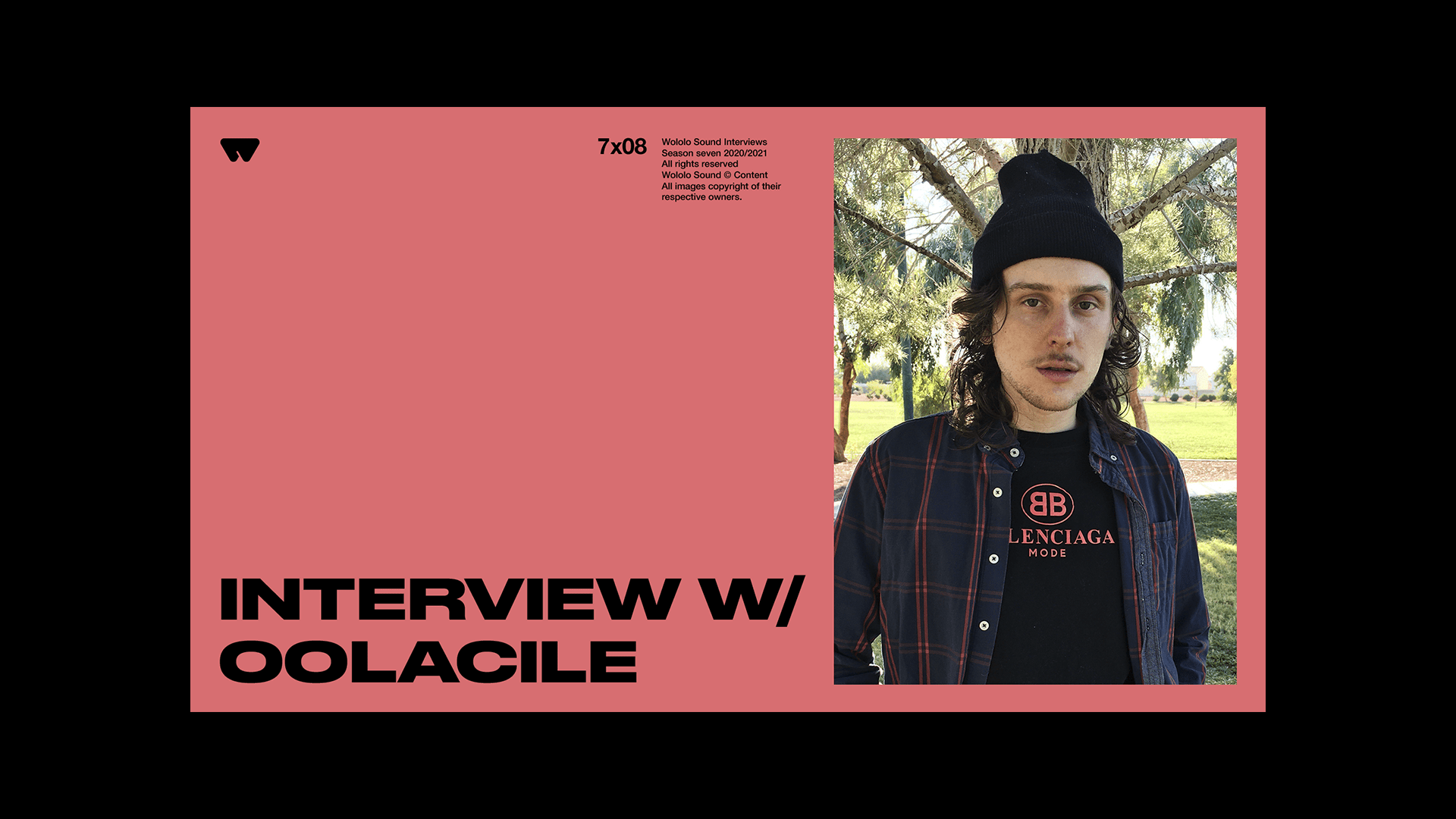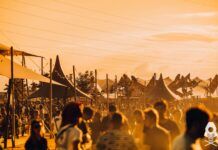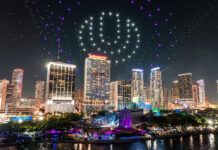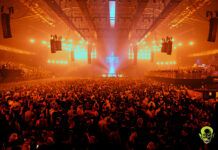Charlamos con Oolacile, una de las figuras más célebres del dubstep y el riddim, quien nos habla sobre su carrera y su nuevo sello
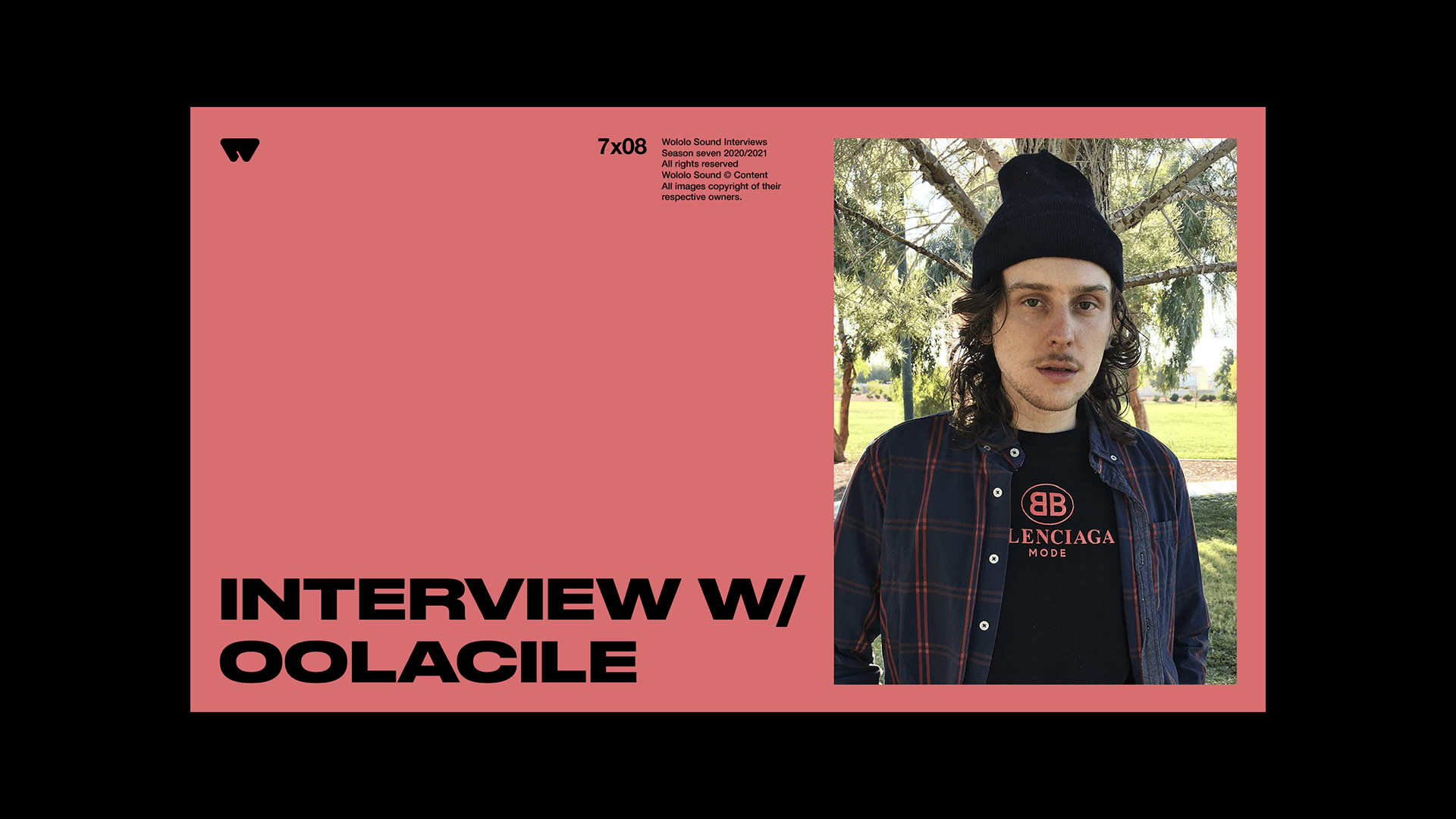
Wololo Sound: ¡Hola, Cooper! Muchas gracias por dedicarnos algo de tu tiempo para esta entrevista, es un placer para nosotros. Esperamos que tú y tus seres queridos estéis bien en estos tiempos tan raros. ¡Vamos con ello!
Wololo Sound: Hello, Cooper! Thank you so much for giving us some of your time for this interview, it is a pleasure for us. We hope that you and your loved ones are doing well in these odd times. Let’s go with it!
Wololo Sound: Lo primero de todo y para aquellos que no estén familiarizados contigo como artista, háblanos sobre quién es Oolacile y cómo te hiciste un hueco en la escena dubstep. Está claro que en muy poco tiempo has llegado a lo más alto, ¿cuál ha sido para ti la clave de tu éxito?
Oolacile: No estoy seguro de si me consideraría alguien que ha llegado a la cima rápidamente. He producido música electrónica durante unos 10 años, con el proyecto de Oolacile alrededor de seis, e incluso aún siento que me queda un largo camino en mi cuanto a mi carrera y hacer crecer mi proyecto. Creo que yo mismo y un puñado de otros productores empezamos hace un tiempo a hacer un nuevo estilo de dubstep que era algo entre el brostep común y un sonido riddim extremadamente underground. Un montón de gente llamaba riddim a nuestra música, pero ninguno de nosotros lo consideraba así realmente, ya que el riddim de verdad era algo como el grupo de los monstruos, los gremlins, los brujos, etc… pero algunos de nosotros acogimos el término y este nos ayudó a evolucionar la escena. También fui afortunado de tener gente en mi vida como Daniel Spira, quien trabajaba en EDM.com y Your EDM, y al legendario 12th Planet apoyándome, teniendo a gente como ellos a mi lado hicieron un montón por dar mi nombre a conocer.
Wololo Sound: First of all and for those who are not familiarized with you as an artist, tell us about who is Oolacile and how did you managed to make a place for yourself in the dubstep scene. It is obvious that you have reached the top quickly, so what would you say that has been the key of your success?
Oolacile: I’m not sure I’d consider myself as someone who has risen to the top very quickly. I’ve been producing electronic music for about 10 years, been doing the Oolacile project for about 6 years, and even now I still feel like I have a long way to go in terms of my career and growing my project. I think myself and a handful of other producers awhile back started to make a new style of dubstep that was kind of in between the more common brostep sound and the extremely underground riddim sound. A lot of people called our music riddim but none of us really considered it that, as real riddim was stuff like the monsters crew, the gremlins, the wizards, etc… but some of us embraced the term and it helped evolve the scene heaps. I also was fortunate to have people in my life like Daniel Spira who worked with edm.com and youredm, and the legendary 12th planet support me, having people like them on my side did a lot to get my name out there.
WS: Recientemente te has alejado de tu sello Havel Records para poder dar un paso más en tu carrera y crear Halcyon. ¿Cuál es la historia de esta nueva etapa de tu vida? ¿De dónde ha salido Halcyon y cuál es su principal objetivo?
O: Havel siempre ha estado más centrado en autolanzar mi propia música y de alguna forma averiguar qué funciona bien para un lanzamiento. Llevaba bastante queriendo lanzar un sello al completo y usé Havel como una herramienta para enseñarme a mí mismo. Utilicé el tiempo que se me dio en la cuarentena para aplicarme con la creación de Halcyon y traerla al mundo. Halcyon pretende ser un lugar en el que los artistas pueden traer su música y confiar en nosotros para desarrollar un mundo alrededor de su música que de otra forma no tendrían el tiempo o recursos para hacerlo.
WS: Recently you have distanced from your label Havel Records in order to move a step forward in your career and create Halcyon. What is the story behind this new period of your life? Where does Halcyon come from and what is its main goal? Is there any exclusives from the label that you can tell us about?
O: Havel was always more intended for me to self-release my own music and kind of figure out what works well for a release. I had wanted to launch a full blown label for awhile and used Havel as a tool to teach myself. I used the time I was given during quarantine to buckle down on creating Halcyon and bringing it to the world. Halcyon is intended to be a place where artists can bring us music and trust us to develop a world around their music that they just otherwise wouldn’t have the time or resources to do.
Oolacile estrena su nuevo sello, Halcyon, con el lanzamiento de un recopilatorio
WS: Vosotros mismos en Halcyon afirmáis que el artista tiene total libertad creativa a la hora de producir. No podemos evitar relacionar esto con la monotonía por la que hemos visto pasar al dubstep en los últimos meses, sobre todo en grandes sellos como Disciple donde sus artistas parecen tener que seguir una estructura específica. ¿Qué opinas de esto? ¿Crees que se está volviendo un género mainstream?
O: Yo todavía no consideraría que el dubstep es “mainstream” pero definitivamente se ha vuelto mucho más corporativo, lo que tiene sus pros y sus contras. Significa que se puede hacer mucho más dinero, pero a veces ese dinero llega a gente que no todo el mundo considera que lo merece. En cuanto a la dirección de arte de otros grandes sellos, creo que está bien, que los sellos deberían poder tener una marca y una imagen que sean consistentes a lo largo de su catálogo. Para mí como artista soy muy específico sobre cómo presentar mi música, siento que a veces esa presentación es casi tan importante como la música en sí. Para ser honestos, Disciple siempre ha hecho un gran trabajo permitiéndome expresarme a través de la música y el arte, pero no diría que han sido consistentes en cada lanzamiento y cada catálogo de sellos, por eso quería crear una nueva alternativa que diese un poco más de flexibilidad sonora y visualmente.
WS: Halcyon states that in the label the artists have full creative freedom when producing. We cannot help relating this with the monotony that dubstep has been experiencing in the last couple of years, especially in big labels like Disciple where their artists seem to follow the same specific structure. What do you think about this? Do you think that dubstep is becoming a mainstream genre?
O: I still wouldn’t consider dubstep to be “Mainstream” but it has definitely become a lot more corporatized which has its positives and negatives. It means there’s a lot more money to be made, but sometimes the money makes its way to people that to not everyone agrees quite deserve it. In regards to the art direction of other bigger labels, I think that its cool, label’s should be allowed to have a brand and image that is consistent through their catalogue. For me as an artist I’m very specific about how my music is presented, I feel like that presentation is nearly just as important as the music itself at times. To be honest Disciple always did a great job of letting me express myself through music and the art, but I wouldn’t say that has been consistent through every release and every labels catalogue, so that’s why I wanted to create a new alternative that gave a bit more flexibility sonically and visually.
WS: Además, Halcyon dice centrarse en el future riddim. Tu compañero Leotrix ha mencionado en alguna ocasión que tú eras el pionero de este nuevo estilo. ¿Podrías hablarnos un poco del mismo? Algunas personas creen que es demasiado pronto para considerarlo un género como tal ya que es simplemente riddim melódico y no hay muchas producciones del mismo. ¿Qué opinas de esto?
O: Melodic y future riddim son básicamente lo mismo. Simplemente son nombres diferentes. Veremos cuál se queda con el tiempo. Me gusta “future riddim” porque combina elementos de future bass y riddim, y creo que tiene mucho sentido sin ser tan literal como suena “melodic riddim”. Todavía no hay mucha gente produciéndolo, lo que creo que es fresco y emocionante, es el comienzo de algo nuevo. Con el tiempo os prometo que escucharéis muchos más temas de future riddim siendo producidos. Incluso justo después del lanzamiento del sello creo que ya se ha cementado él solo como algo muy real.
WS: Moreover, Halcyon is mainly focused on future riddim. Your colleague Leotrix mentioned once that you were the pioneer of this new style. Can you tell us a little bit about it? Some people believe that it is too soon to consider it a genre itself, as it is simply melodic riddim and there are not a lot of productions yet. What do you think about this statement?
O: Melodic Riddim & Future Riddim are essentially the same thing. It’s simply different names. We will see which sticks over time. I like future riddim because it combines elements of Future Bass with Riddim, I think it makes a lot of sense without being super on the nose like Melodic Riddim is. There aren’t a lot of people making it yet which I think is fresh and exciting, it’s the beginning of something new. Over time I promise you we will be hearing a lot more Future Riddim tracks being produced. Even just since the launch of the label I think it has already cemented itself as a very real thing.
WS: Tu sello presume de tener los royalties más altos de la industria de la bass music. Recientemente muchos artistas se han manifestado contra Spotify exigiendo el cobro de un centavo por reproducción, puesto que con los royalties actuales aseguran no poder siquiera cubrir los gastos. Lo mismo ocurre con muchas discográficas y distribuidoras ¿Consideras que en este sentido el artista es esclavo de la industria? ¿Cómo crees que debería cambiar esto y cómo lo esta haciendo Halcyon?
O: Por desgracia, Halcyon no tiene control sobre los royalties que pagan las plataformas como Spotify y iTunes. Parece que la mayoría de los sellos en estos tiempos han estado aumentando los beneficios de sus royalties para mantener su modelo de negocio viable. No planeo hacer millones de dólares con Halcyon, aparte de que tengo una carrera musical en solitario que ya me da dinero, así que me siento feliz de renunciar a más. Cuando los sellos crearon el reparto del 50% (de beneficios) hace un tiempo, normalmente le daban decenas de miles, a veces millones, a artistas para hacer nuevos trabajos. Tener un sello por aquel entonces era una gran tarea y por eso se quedaban el 50%. A día de hoy los sellos hacen cada vez menos. En algunos casos, la mayor parte de las cosas que se necesitan para sacar un release son cosas que la mayoría de los artistas podían hacer por su cuenta si manejaran bien su tiempo y sus medios. La gente ya no compra música, y se hace mucho menos dinero en general, asi que es un tema complicado pero eso es lo que pienso.
WS: Your label shows off to have the highest royalties in the bass music industry. Lately, many artists have protested against Spotify demanding 1 cent. per streaming, as the current royalties are not enough, not even for covering the costs. The same happens with most music labels and distributors. Do you think that in this sense the artist is a slave of the industry? How do you think that this should change and how is Halcyon doing it?
O: Unfortunately, Halcyon has no control over the royalties music retailers like Spotify and iTunes pay out. What we do control is how much of that royalty we keep. It seems most labels these days have been increasing their royalty shares to combat this to keep their business model viable. I do not plan to make millions of dollars on Halcyon, plus I have a solo music career that makes me money, so I am happy to give up more. When labels developed the 50% split a while ago, they were typically putting up tens of thousands sometimes millions for artists to record records. Having a label then was an insanely huge asset and that’s why they took 50%. Nowadays labels do less and less. In some cases, most things required to put together a release are mostly things artists can do on their own if they can manage their time and resources properly. Granted people don’t buy music anymore, and there is a lot less money to be made in general, so it is a complex subject but those are my thoughts.
WS: Volvamos un momento a Oolacile como DJ, a quien hemos visto sobre todo por los line ups estadounidenses. ¿Qué diferencias encuentras en cuanto a la escena dubstep en Estados Unidos y la de Europa, tanto en cuanto a festivales, como público y producciones?
O: No estoy seguro de que pueda señalar diferencias en la producción musical basadas en la región porque siento que se basa íntegramente en el individuo y no en su geografía o cultura. Sin duda Estados Unidos tiene los mayores shows y la mayor producción en general comparado con Europa y otros lugares en los que he pinchado. A veces siento que el público americano espera MUCHO de los eventos, lo que está bien porque significa que las compañías de eventos y los artistas necesitan seguir evolucionando y expandiéndose para satisfacerles. En Europa los shows por lo general son más pequeños y un poco más oscuros (menos producción) pero el ambiente y la energía siempre son lo más. Me gusta especialmente pinchar en Paris, y el show que tuve en Israel fue pequeño pero extremadamente especial, una energía increíble esa noche.
WS: Let’s go back for a moment with Oolacile as a DJ, who we have seen mainly on the USA line ups. What differences do you see between the United States dubstep scene and the European one, regarding festivals, crowds, and music productions?
O: I’m not sure I can spot music production differences based on region because I feel like that is entirely based on the individual and not so much their geography or culture. The United States definitely has the biggest shows and the biggest production overall compared to Europe and other places I’ve performed. Sometimes I feel the American crowds have come to expect A LOT out of events, which is fine because it means the event companies and the artists need to keep evolving and expanding to satisfy them. In Europe shows are generally smaller and a bit darker (less production) but the vibes and energy are always top notch. I especially love to play in Paris, and the one show I had in Israel was small but extremely special, amazing energy that night.
Wololo Sound entrevista a Oddprophet
WS: Antes de toda esta locura de la pandemia, pudimos apreciar como los DJs y productores de dubstep americanos empezaban a interesarse por el drum & bass, tanto a la hora de producir como incluyéndolo en sus sesiones. ¿Crees que la estrecha relación que hay actualmente entre ambos géneros podría llegar a fusionarlos, en el sentido de que todos los tracks de dubstep incluyeran drum & bass? ¿Alguna vez has querido probar otros géneros fuera del dubstep y el riddim?
O: ¡Jaja! Siento que vemos este tema de que los DJs americanos de dubstep intentan hacer popular al drum & bass cada pocos años. Supongo que nunca llega a enganchar. Hay un montón de razones por las que no termina de enganchar, pero creo que la principal es que la audiencia de Estados Unidos simplemente no disfruta con música más rápida. Incluso géneros como el hardcore y el hardstyle tienen el mismo problema. El drum & bass tiene un pequeño pero fuerte público en Estados Unidos. Hay eventos como RESPECT y Xcellerated que tienen lugar en LA a menudo, si la gente quiere un show de drum & bass en los estados, ¡deberían mirar esos eventos!
WS: Before all this crazy pandemic thing, we could appreciate that American dubstep DJs and producers started to be interested in drum & bass, both when producing and including DnB tracks on their sets. Do you think that the close relation that is currently between the two genres could get them together one day, in the sense of dubstep tracks including drum & bass? Have you ever wanted to try other genres rather than dubstep or riddim?
O: Haha, I feel like we see this thing where American Dubstep DJs attempt to make DnB popular every few years. It never catches on though. There are a lot of reasons it doesn’t catch on, but I think the main one is the US audience just doesn’t vibe with faster music. Even genres like Hardcore & Hardstyle have a similar problem. DnB has a small but strong audience in the US. There are events like RESPECT and Xcellerated that happen in LA very frequently, if people want a DnB show in the states they should check out those events!
WS: El COVID-19 es la cuestión del momento, además de que está afectando gravemente al sector musical. Ha habido mucha polémica entre artistas sobre si deberían regresar los shows o no con la situación actual. ¿Cuál es tu posición sobre esto? ¿Crees que es rentable celebrar festivales con las medidas sanitarias requeridas, las cuales implican una reducción de aforo y una mayor inversión de presupuesto en las mismas?
O: Yo personalmente creo que tendríamos que haber tenido un confinamiento más estricto en EU. No soy muy partidario de hacer eventos ahora mismo. Creo que necesitamos tener un confinamiento más duro, dejar al virus morir, y entonces empezar lentamente a abrir la industria. Por desgracia, no nos encerramos muy severamente y un montón de gente siguió con sus vidas con un pequeño ajuste.
WS: COVID-19 is the matter of the moment, especially when it affects severely to the music industry. There has been a lot of discussion among artists regarding if shows should be back or not within the current situation. What is your view on this? Do you think that is worthwhile to arrange a festival with the necessary sanitary measures, which imply a reduction of the capacity and a higher investment of the budget on them?
O: I personally believe that we should have had a stricter lock down in The States. I’m not a big supporter of any events happening right now. I’m under the belief we need to have a strong lockdown, let the virus die, and then slowly start opening things up. Unfortunately, we didn’t lock down very hard and a lot of people still continued about their lives with little adjustment.
WS: Nos gustaría saber un poco más sobre ti como productor. ¿Qué artistas dirías que han sido para ti modelos a seguir? ¿Hay algún artista en concreto que te llevara a producir dubstep? Actualmente están saliendo a la luz muchos artistas jóvenes como Leotrix, Moore Kismet o SYZY que podrían formar la próxima generación de grandes figuras del género. ¿Qué artistas has descubierto recientemente y recomendarías a nuestros lectores?
O: Tengo un montón de inspiraciones. Me metí al dubstep hace alrededor de 10 años cuando estaba emergiendo. Los canales por los que descubrí esta música fueron Ministry Of Sound y UKF. Los artistas que descubrí ahí fueron los que me presentaron este sonido.
Sí, estoy totalmente de acuerdo. Me gusta muchísimo la música de Leotrix, Moore y Syzy. Hay un montón de talento de locos emergiendo ahora mismo. Algunos otros que me están gustando especialmente ahora son NUU$HI, Papa Khan, Ace Aura, Octane, Phonon, Vayre, BVSSIC, Voltra, Protial, Qwaston, Nox… no sé, hay tantos que seguramente me estoy dejando a un montón de grandes productores, pero la gente sin duda debería echar un vistazo a los que he mencionado si no les resultan familiares.
WS: We would like to know a little bit more about you as a producer. Which artists would you say that have been role models for you? Is there anyone in particular that made you start producing dubstep? Currently a lot of young artists are being discovered such as Leotrix, Moore Kismet or SYZY, who could be the next generation of huge icons of the genre. What artists have you discovered lately and would you recommend to your listeners?
O: I have a lot of inspirations. I got into dubstep over 10 years ago around when It was first emerging, the outlets through which I discovered that music was Ministry Of Sound and UKF. The artists I discovered on there are what introduced me to the sound.
Yea I absolutely agree. I love Leotrix, Moore and Syzy’s music so much. There is so much insane emerging talent right now. Some more people that I’m really feeling right now are NUU$HI, Papa Khan, Ace Aura, Octane, Phonon, Vayre, BVSSIC, Voltra, Protial, Qwaston, Nox, idk there’s so many people I’m definitely leaving out a lot of great producers, but people should definitely check out everyone I mentioned if they aren’t familiar with them.
WS: Para terminar, ¡vamos con una ronda de preguntas cortas!:
- Canción favorita no electrónica: Esa es una pregunta difícil. No creo que pueda elegir una canción. Soy un gran fan del metal, también me gusta mucho el Kpop, ¡pero sinceramente creo que el Kpop es bastante electrónico, jaja!
- Club o festival favorito en el que hayas actuado: EDC fue increíble
- Un B2B que te encantaría hacer con alguien que no haga dubstep: Fácil. Flume o Porter Robinson. Ambos son enormes inspiraciones para mí.
- Una colaboración soñada: Si, misma respuesta, Flume o Porter Robinson
- Palabra española favorita: biblioteca
To conclude, let’s go with a couple of short questions!:
- Favorite non EDM song: This is a difficult question. I don’t think I can pick a song. I’m a big metal head, I also like Kpop a lot but honestly kpop is pretty EDMy haha
- Favorite festival or club you have performed at: EDC was amazing
- A B2B you would like to perform with someone who is not into dubstep: Easy. Flume or Porter Robinson. Both are massive inspirations to me.
- A dreamed collab: Yea, same answer, Flume or Porter Robinson.
- Favorite Spanish word: biblioteca
That’s all Cooper, thank you so much for this interview!


